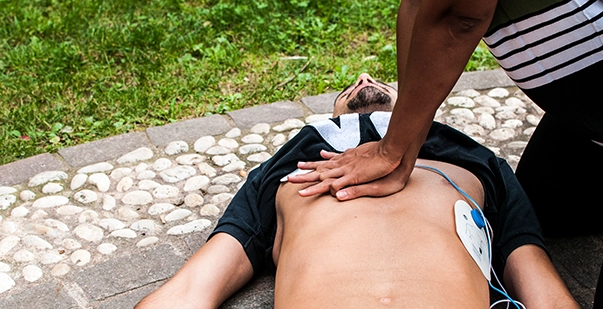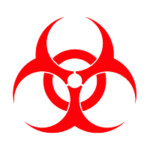Cardiac arrest is a major cause of death in the U.S., taking between 300,000 and 450,000 lives each year. It can occur suddenly and without warning, affecting anyone, anywhere, at any time. Sadly, around 2,000 young people under 25 also die from sudden cardiac arrest each year in the U.S. Knowing the risk factors, recognizing the symptoms, and understanding treatment options are key to preventing these tragedies.
Cardiac arrest occurs when the heart stops pumping blood effectively which results in interruption of blood flow to the brain and other vital organs. This can be due to hereditary factors or lifestyle choices or existing medical conditions. Recognizing signs such as sudden collapse, no pulse and irregular breathing may be all that separates a person from life or death. Immediate interventions such as Cardiopulmonary resuscitation (CPR) would be lifesaving followed by emergency medical attention.
This article will highlight what you need to know about Cardiac Arrest including risk factors, symptoms and treatment so that people might become aware of it and realize that immediate action can save their lives.
What is Cardiac Arrest?
Cardiac arrest is a critical heart condition where the heart suddenly stops beating. This can also be called sudden cardiac death.
Our heartbeat is controlled by electrical signals, and if these signals change, the heart’s rhythm can become irregular. This irregular rhythm is known as an arrhythmia. Some arrhythmias make the heart beat too slow or too fast. Cardiac arrest happens when the heart’s rhythm stops completely.
Cardiac arrest is a very serious health issue. According to the Institute of Medicine, over half a million people in the United States experience cardiac arrest every year. This condition can lead to death or serious disability. If you or someone around you shows signs of cardiac arrest, get emergency medical help immediately.
What Causes Cardiac Arrest?
So, what causes cardiac arrest? Cardiac arrest can happen for different reasons, mostly linked to problems with the heart’s electrical system. Here are some common causes:
1. Arrhythmias
Arrhythmias are irregular heart rhythms that can disrupt the normal electrical impulses controlling the heartbeat. It could become faster than normal, slower than usual or beat irregularly; hence not producing a good blood flow.
Ventricular fibrillation, a type of arrhythmia, is particularly dangerous as it causes the heart’s ventricles to quiver instead of contracting properly, preventing blood from being pumped effectively.
This can result in a sudden loss of heart function, known as cardiac arrest, which requires immediate medical intervention to restore a normal rhythm and prevent severe complications or death.
2. Coronary Artery Disease
Coronary artery disease (CAD) occurs when the coronary arteries, which supply blood to the heart muscle, become narrowed or blocked due to the buildup of plaque—a combination of fat, cholesterol, and other substances.
This restriction in blood flow can lead to a reduction in oxygen and nutrients reaching the heart, causing chest pain (angina) or even a heart attack. When the heart muscle is deprived of oxygen, it can trigger life-threatening arrhythmias, significantly increasing the risk of cardiac arrest.
Managing CAD through lifestyle changes, medications, or surgical interventions is crucial to prevent these severe complications.
3. Cardiomyopathy
Cardiomyopathy is a heart condition where the heart muscle becomes weak, making it difficult for the heart to pump blood efficiently throughout the body. This condition can lead to the heart becoming enlarged, thickened, or stiff, which disrupts its normal function.
As a result, the heart may struggle to maintain a regular rhythm, increasing the risk of arrhythmias. These irregular heartbeats can be severe enough to cause cardiac arrest, where the heart suddenly stops beating. There are two types of cardiomyopathy:
- Hypertrophic cardiomyopathy (HCM)
- Dilated cardiomyopathy (DCM)
Hypertrophic cardiomyopathy (HCM) is when the heart muscle becomes thicker than normal, which can block blood flow and cause chest pain and shortness of breath. On the other hand, Dilated cardiomyopathy (DCM) is a condition where the heart chambers enlarge and weaken, making it harder for the heart to pump blood efficiently, leading to symptoms like fatigue and swelling.
Cardiomyopathy is one of the leading heart diseases in the U.S. In the 2000s, around 700,000 to 725,000 people in the US were estimated to have Hypertrophic Cardiomyopathy (HCM), affecting more than 1 in 500 people. However, many of these cases went undiagnosed.
For Dilated Cardiomyopathy (DCM), the prevalence between 2017 and 2019 was estimated at 118.33 per 100,000 people. This rate was higher among adults aged 65 and older, males, and African Americans. By 2019, there were about 388,350 people in the US living with DCM.
4. Heart Valve Disease
Heart valve disease happens when one or more of the heart’s valves don’t work right, affecting how blood flows through the heart. This can cause problems like valve stenosis, where the valve gets too narrow, or valve regurgitation, where the valve leaks.
These issues make the heart work harder to pump blood, which can weaken the heart muscle over time.
The increased strain and potential for blood flow disruption can trigger arrhythmias, significantly raising the risk of cardiac arrest.
5. Scarring of Heart Tissue
Scarring of heart tissue, often resulting from a previous heart attack or other cardiac conditions, can disrupt the normal electrical pathways in the heart. This disruption makes the heart more susceptible to dangerous arrhythmias, which can lead to cardiac arrest.
The scar tissue interferes with the heart’s ability to conduct electrical signals properly, increasing the risk of life-threatening irregular heartbeats.
This is why individuals with a history of heart attacks or significant heart damage are at a higher risk of experiencing cardiac arrest.
6. Electrical Abnormalities
Electrical abnormalities in the heart, such as Wolff-Parkinson-White syndrome and long QT syndrome, can lead to cardiac arrest by disrupting the heart’s normal rhythm.
These conditions cause irregular electrical signals that can trigger dangerous arrhythmias, making the heart beat too fast, too slow, or erratically. This disruption in the heart’s electrical system can prevent it from pumping blood effectively, leading to a sudden loss of heart function and, ultimately, cardiac arrest.
Early diagnosis and management of these conditions are crucial to reduce the risk of cardiac arrest.
7. Recreational Drug Use
Drugs like cocaine and meth can cause serious heart problems. They overstimulate the heart, making it work harder and increasing the risk of irregular heartbeats.
These drugs can also make the coronary arteries spasm, which cuts off blood flow to the heart and can lead to a heart attack
The combination of these effects can disrupt the heart’s normal rhythm and function, resulting in a sudden and life-threatening cardiac arrest.
8. Blood Vessel Abnormalities
Blood vessel abnormalities, such as rare congenital defects in the coronary arteries or the aorta, can lead to cardiac arrest, especially during intense physical activity.
These abnormalities can cause restricted blood flow or sudden blockages, depriving the heart muscle of oxygen and nutrients. This can result in severe arrhythmias or a heart attack, both of which can trigger cardiac arrest.
Early detection and management of these vascular anomalies are crucial to prevent such life-threatening events.
Risk Factors of Cardiac Arrest
Cardiac arrest happens when the heart abruptly and unexpectedly stops pumping. Knowing the risk factors can help prevent it and ensure quick action if it occurs. Here are some important risk factors to be aware of:
1. Alcohol and Drug Use
These substances can affect your heart. For example, drinking too much alcohol can make your heart weak and less effective at pumping blood. When your heart is weak, it can lead to heart failure or irregular heartbeats, which can increase the risk of a heart attack.
The NHS suggests that both men and women should have no more than 14 units of alcohol each week. This is roughly the same as six medium glasses of wine or six pints of 4% beer, and it should be spread out over at least three days.
On the other hand, the VA advises women to have no more than one drink a day and seven drinks a week, while men can have up to two drinks a day and 14 drinks a week.
2. Family History
A family history of heart disease can raise the risk of heart attacks because of both genetic factors and similar lifestyle habits.
Some gene changes inherited from parents can increase the chance of having high blood pressure, high cholesterol, and coronary artery disease. All of these conditions can eventually lead to heart attacks.
3. Heart Disease
Heart disease can affect how the heart works and looks in different ways. Conditions that might lead to a sudden heart stop include:
- Cardiomyopathy
- Heart valve problems
- Coronary artery disease (CAD)
- Electrical issues like Long QT Syndrome (LQTS)
We’ve already covered these conditions earlier.
4. High Blood Pressure
High blood pressure, also called hypertension, can seriously affect your heart and blood vessels over time. It can lead to problems like an enlarged heart, coronary artery disease, heart attacks, and heart failure. All of these issues can increase the risk of cardiac arrest.
5. High Cholesterol
High cholesterol can cause fatty deposits, or plaque, to build up in your arteries. This leads to a medical condition called atherosclerosis. It makes the arteries narrower and limits blood flow to the heart. If the plaque breaks apart, it can create a blood clot that might block the artery, potentially leading to a heart attack.
6. Obesity
Extra weight puts more stress on your heart. When you’re overweight, your heart has to work harder to move blood around your body. This extra effort can cause your heart muscle to become enlarged, which may lead to serious problems like heart attacks.
From 1999 to 2020, deaths from heart disease linked to obesity tripled. This highlights the importance of maintaining a healthy weight to reduce your risk of heart issues
7. Smoking
Cigarettes contain nicotine, which speeds up the sympathetic nervous system. This can cause your heart to beat faster and raise your blood pressure, which puts extra stress on your heart.
Cigarettes also have carbon monoxide, which lowers the amount of oxygen in your blood. As a result, your heart has to work harder to deliver oxygen throughout your body.
Over time, this extra effort can weaken your heart and even lead to serious issues like cardiac arrest.
Symptoms of Cardiac Arrest
Symptoms of cardiac arrest can differ between men and women, with women more likely to experience less common symptoms.
While both genders can share common symptoms like chest pain and shortness of breath, women tend to report more atypical symptoms. Cardiac arrest symptoms are often sudden and severe.
Here are the most common symptoms for both men and women:
1. Sudden Collapse
Sudden collapse during cardiac arrest occurs when the heart unexpectedly stops pumping blood effectively, leading to an immediate loss of consciousness. This happens because the brain and other vital organs are deprived of oxygen-rich blood.
The person may fall to the ground and become unresponsive, requiring urgent medical intervention to restore normal heart function and prevent severe damage or death.
2. No Pulse
No pulse during cardiac arrest means that the heart has stopped beating effectively, resulting in the absence of a detectable heartbeat. This occurs because the heart’s electrical system malfunctions, causing it to stop pumping blood.
As a result, blood flow to the brain and other vital organs ceases, leading to unconsciousness and the need for immediate medical intervention.
3. No Breathing
No breathing during cardiac arrest means that the person is not taking in air or may exhibit abnormal gasping breaths known as agonal respirations. This happens because the heart has stopped pumping blood, so the brain and other important organs aren’t getting the oxygen they need.
Without immediate intervention, such as CPR, the lack of oxygen can cause irreversible damage or death. Recognizing the absence of normal breathing is crucial for initiating life-saving measures promptly.
4. Chest Pain
Chest pain during a cardiac arrest is a serious sign that the heart isn’t working right, which means blood isn’t reaching important parts of the body. This pain can feel like pressure, squeezing, or discomfort in the chest.
However, it’s important to note that chest pain can also be a symptom of other conditions, such as anxiety, acid reflux, or muscle strain.
Other symptoms that may appear in the hour before cardiac arrest include:
- Fatigue
- Dizziness
- Shortness of breath
- Nausea
- Heart palpitations
- Unexplained wheezing
- Fainting or near fainting
- Lightheadedness
However, many people who experience cardiac arrest have no prior symptoms.
Treatment of Cardiac Arrest
Cardiac arrest can be treated in two main ways: first, with CPR, which is performed immediately when someone has a cardiac arrest. Second, with specific medications that can help. Let’s take a closer look at both methods.
1. Cardiopulmonary resuscitation (CPR)
Sudden cardiac arrest is a serious emergency, but prompt action can save lives. If treatment starts within the first few minutes, survival rates can be up to 90%. But for every minute that goes by without treatment, the chance of survival drops by about 10%.
If someone has sudden cardiac arrest and you are there:
- Call 911 right away.
- Start CPR: Even if you don’t know the full CPR technique, just doing chest compressions (hands-only CPR) can help. This keeps blood and oxygen moving until help arrives.
- Use an AED: If there’s an automated external defibrillator (AED) nearby, use it. AEDs give electric shocks to the heart to restore a normal heartbeat, increasing the chance of survival.
When emergency responders arrive, they may use a defibrillator to give a shock that helps restart the heart if it hasn’t been done already. The defibrillator sends an electric current through the chest to stop abnormal heart rhythms and restore a normal beat. Sometimes, it may take more than one shock to get the heart beating normally again.
To learn more about CPR and improve your response skills, consider getting a CPR certification through a reputable provider.
2. Medication
The treatment of cardiac arrest with medication focuses on restoring heart rhythm and supporting circulation. Epinephrine (adrenaline) is often used to increase blood flow to the heart and brain by constricting blood vessels.
Moreover, anti-arrhythmic drugs like amiodarone or lidocaine may be administered to stabilize the heart’s rhythm. In some cases, vasopressin and steroids are used alongside epinephrine to enhance short-term survival.
While these medications are crucial during resuscitation, the primary emphasis remains on defibrillation, oxygenation, and high-quality chest compressions. Medications are typically given via intravenous (IV) or intraosseous (IO) routes, with endotracheal (ET) administration as an alternative if IV/IO access is unavailable.
Conclusion
Knowing about cardiac arrest—its risk factors, symptoms, and treatments—can save lives. Being aware of risks like family history, poor lifestyle choices, and certain health conditions helps us take steps to lower our chances of having a cardiac arrest. Recognizing symptoms like sudden collapse, no pulse, and irregular breathing allows for quick action, which is crucial in emergencies. Immediate actions such as performing CPR and using a defibrillator can greatly increase survival chances.
Interestingly, survival rates for cardiac arrest have improved a lot over the years. This is thanks to better medical technology and more public awareness. For example, having automated external defibrillators (AEDs) available in public places has made it easier for people to provide life-saving help before professionals arrive. This progress shows how important it is to stay informed and be prepared.






